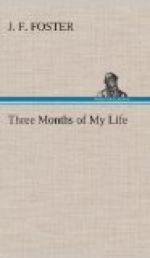SEPTEMBER 10th.—To Kohala, six miles, nearly all the way down a terribly steep and rough hill to the banks of the Jhelum—which river has taken a great bend among the mountains and now runs at right angles to its former course. A ferry boat crosses the torrent at this spot and the passage during the summer is attended with considerable danger, as the stream runs at the rate of twenty miles an hour. I got my baggage in it and landed upon British soil at the other side. The Dak bungalow is just above, but we were very much crowded as all the other people remained for the night. After dinner a great thunderstorm took place accompanied with very heavy rain.
SEPTEMBER 11th.—Marched to Dargwal, twelve miles, up hill all the way, but the road is broad and smooth, so that the march was quickly and easily accomplished. M—— and his wife did not come in till the middle of the day as they could not get coolies in time to start early. There is a good furnished bungalow here, our other fellow travellers have gone on to Murree, so we have the house to ourselves.
SEPTEMBER 12th.—To Murree, ten miles, road the same as yesterday. Went to Woodcot, and found Spurgeon, Gordon, and Egerton, of the 36th; Hensma and Beadnell, 77th; and Dalrymple, 88th. Put up with them sharing Spurgeon’s room. Spent a pleasant time at Murree, doing very little—a long rest of ten days after my labours—and on the 22nd, at 1 o’clock, I took my seat in the mail cart with Redan Massy for my companion, and started on my journey to Peshawur. Arrived at Rawul Birder at 6 in the evening, and went on at once by the Government van. Had no time for food. Got to Peshawur at 7 o’clock next morning, and thus ended my three months sick leave. And now I go back to the din and bustle of life, the empty conventionalities of society, the noise and glitter of mess; to the re-pursuit of my profession, and to learn again by the bedside of many a dying man how weak and powerless is that profession to combat the ills that flesh is heir to. I sometimes wish I could exchange my present calling. Terrible thoughts often assail me, after the death of any of my patients. Questions as to whether I am at all responsible for the fatal issue. Whether by lack of knowledge that I should possess or by careless observation during the progress of the disease, I have allowed a man to die who might have been saved, or pushed into the grave one who was only trembling with uncertainty upon its brink. Yet as a set off against these feelings there is the satisfaction experienced when sufferings are relieved or health restored by the interposition of my aid. The profession of medicine is potent for good and evil. For good in the hands of him who makes it his lifelong study; for evil in his hands who adopts it merely as a respectable means of obtaining his livelihood. It is noble in the one case; detestable in the other. You do not know how detestable. If the vail could be raised, if you




